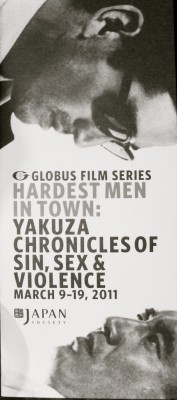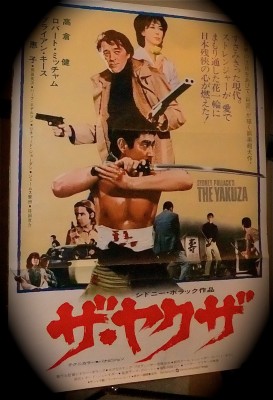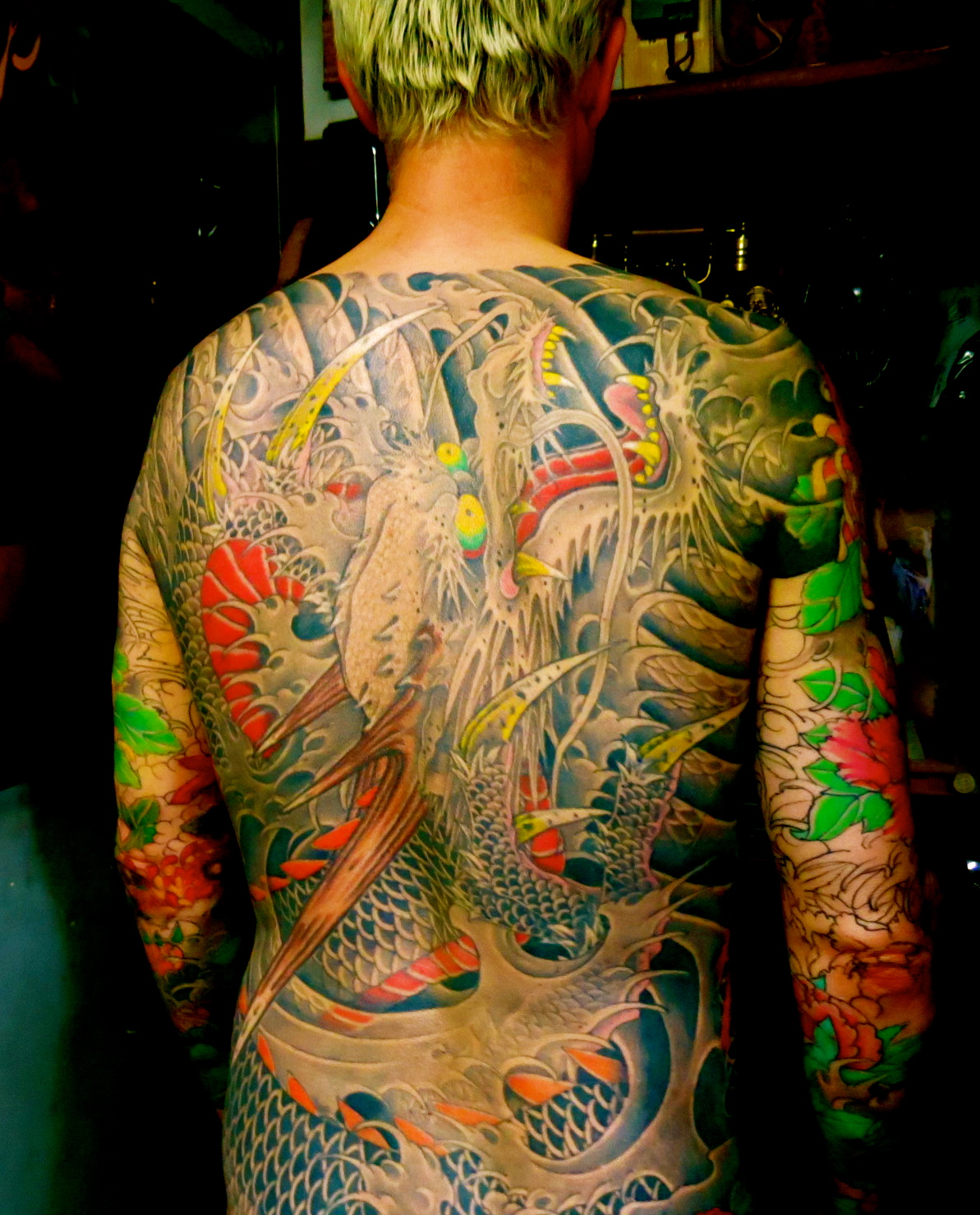In honour of Japan’s Celebration of Cinema Day, December 1st, we’ve reposted some reviews and articles on classic films. Some good, some bad, some epic.This was originally posted on March 10th 2011. (Wow, who would have guessed what would happen a day later.) It has been reposted to commemorate the passing of yakuza movie icon, Ken Takakura, on November 10th 2014.
Today, March 9th, began the first day of the Globus Film Series, Hardest Men in Town: Yakuza Chronicles of Sin, Sex and Violence presented by the Japan Society New York.

The film festival opened with a bang or rather the swoosh of a katana (刀) slashing through the air with the showing of Sydney Pollack’s overlooked 1975 classic gangster film, The Yakuza, which starred Toei Yakuza film regular Takakura Ken and film noire/hardboiled action star, Robert Mitchum. “Mitchum, in one of his best roles of the 1970s, is drawn to the Orient by an army buddy (Brian Keith), whose daughter has been kidnapped. But when he gets to Japan, Mitchum finds that her kidnappers are the shadowy Yakuza, the Japanese Mafia–an organization that is as vicious as it is tradition-bound. He must call on friends he made after World War II for favors and finds himself unintentionally trampling on issues of honor, even as he battles for his life and that of the girl he is seeking.” (from Amazon.com)
The script was written by Paul Schrader, better known for writing such classics as Taxi Driver and Raging Bull. It is probably one of the most unique yakuza films ever made, in which an American and an ex-yakuza form an uneasy alliance. Takakura Ken would later go on to play the stiff, rule-bound but honorable organized crime control division detective in Ridley Scott’s Black Rain. In the genre, the only thing that comes close to having the same components is Kitano Takeshi’s Brother. (PS. If you can find a copy of the Japanese original version which is 40 minutes longer than the cut released in the west, watch it instead of the US version. It makes it a much better film.)
The tag-line for The Yakuza when released on DVD is an eloquent summary of the yakuza code. “A man never forgets. A man pays his debts.” While the movie is not as close to approaching the realism of 鬼火 (Onibi: The Fire Within) which has its US debut tomorrow (March 10th), it is an amazing film and the sword fighting scenes at the climax are breathtakingly done and some of the tensest action scenes you’ll ever see in any film.
After Paul Schrader did the introductions, I was lucky enough to have dinner with him, and Stephen E. Globus who made the event possible. During his prefatory remarks, and before and after dinner, Mr. Schrader shared the story of how he became interested in the yakuza and the background to the film and his other still-banned-in-Japan masterpiece, Mishima, which depicted the life of famous Japanese novelist and late-blooming right-wing idol Mishima Yukio. Mishima committed seppuku, or hara-kiri (ritual self-embowlment), at Japan’s Self-Defense base in Ichigaya as his final literary statement. According to Mr. Schrader, he intended to write a final poem with a brush-pen dipped in the blood flowing from his guts. Unfortunately, his subordinate botched the job of lobbing off Mishima’s head and other things left that final poem unwritten.
When I was a student at Sophia University in the 90’s, I taught English to one of the doctor’s who performed the autopsy of Mishima. He told me that his shoulders had three or four deep cuts where his disciple had clearly missed the target: Mishima’s neck. This evening while drinking Otokoyama (男山, Man-Mountain), my favorite sake, with the screenwriter, Mr. Globus and members of the Japan society, was the first time I ever knew that there was more botched in that final act than just the decapitation. In his closing remarks, Mr. Schrader also noted that originally Takakura Ken had been offered the role of Mishima but politely bowed out later saying obliquely and apologetically, “There are certain forces that do not want me to do this film and as part of that subculture, I must decline.”
Schrader’s original reason for being interested in the yakuza and film about them came from his brother, who was living in Japan, and wrote him of those amazing Toei studio yakuza films, and the splendor of Japanese life. Schrader expressed his fondness for the rigid rules and politeness of Japanese society, noting, “If I had grown up under those rules, I would have probably hated them. But as a foreigner, I benefit from them but yet am not expected to obey them.” His own daughter was born in Japan in the 80’s on a particularly auspicious day. He hopes someday to be invited to the Tokyo Film Festival but as of yet, since the making of the controversial Mishima and the refusal once of the film festival to show it, he hasn’t been invited to Japan as a speaker for any film festival. The reality of the yakuza (and their hold on Japan’s film industry) are not the only taboo subjects in Japan.

Tomorrow, March 10th, I will be lecturing on Yakuza In Popular Media & Real LIfe: Cracks and Chasms from 6:30 pm. This will be followed by the U.S. premiere of the fantastic Onibi: The Fire Within. It was an honor and a pleasure to meet Mr. Schrader who was funny, humble, and even accommodated my request for the obligatory commemorative photo.

(Please notice, that in a bow of respect to Sandra Barron’s amazing article on the history of the peace sign in Japan, that I’m making the mandatory V-sign and/or peace gesture.)

Great post, like everything else that is here. I read everything, and explore it afterwards.
This one is no exception. Although I have seen both the Japanese and US versions, not to mention all the other movies you mention – good to know they are still being recognized by some people.
I only wish to correct that your link about peace signs goes to an unrelated article (also interesting of course!). Could you re-link to the peace sign article?
Thank you! I think I fixed the link. What’s your favorite yakuza movie, if I may ask?
Very nice article. I have not seen The Yakuza yet. I will definitely have to locate it and watch it.
Mishima is banned in Japan? That seems odd.
I’ve lately developed an interest in yakuza-films, so I’m happy for the suggestions, as I haven’t seen any of the films mentioned. So far I’ve been watching The Yakuza Papers – Battles Without Honor & Humanity -series of films by Fukasaku Kinji and have been enjoying them.
PS: I see Jake-san is conveniently posing with V-sign in the picture just when an article discussing it has been published.
Ach, didn’t notice the text below picture. My attempt to be smartass backfired.
Jan, it was a valiant effort. 😀
Paul Schrader is, in my opinion, a criminally underrated filmmaker. Sure, he gets the credit for some of the films considered to be the best like Taxi Driver and Raging Bull, but Mishima may be one of cinema’s crowning achievements in scripting and film editing. The way the movie is put together it shouldn’t work at all, but you hardly even notice as it drifts in and out of the various novels and Mishima’s life. All four segments fit together perfectly.
Jake, are you guys okay?
We are all safe. I’ve spent the last day checking up on friends and taking care of things while in NYC.
Thanks for asking.
Excellent blog and comments Jake! I am very jealous that you had the chance to meet Mr. Schrader. In fact, it was on a trip to Japan 7 years ago, that I discovered Yakuza-Eiga, Mishima, Takakura Ken, Tadanori Yokoo and much more. All of which changed my life (and art) for the better.
Mishima is an excellent film – I love, love that scene when they are in the car singing the theme song to one of Takakura Ken’s best roles (also shown at this Japan Society festival) – Showa Zankyo-den.
Best,
Sean
My appreciation for Takakura Ken has only grown in the 11 years that I have been here. My first “encounter” with Ken-san was in my early teens back in the States when I watched the movie “Mr. Baseball”. That movie fascinated me on so many different levels… Not for the plot, but for the window it provided into a country that I knew very little about. I remember walking through the Ose Kannon district in Nagoya with a friend years back and shouting “Dude, that’s the shrine where they prayed at in Mr. Baseball!”
But I regress. When I first saw Takakura Ken in “Mr. Baseball”, I had no idea that he was such a legend in the film industry in Japan. However, his performance left a deep impression on me. Then two summers ago I recorded the movie “The Yakuza” when it was shown on cable TV here. As you said, it is a “criminally” overlooked masterpiece. Stellar cast, brilliant scripting, perfect score, and masterful camera work. The chemistry between Ken-san and Mitchum is truly wonderful to behold. Nothing is forced, they both play their parts perfectly and convincingly. Better yet, the film provides us with a look at Japan in the 1970s, when the nation was really coming of age in the post-war period. Ken-san has given me a lot of homework, and I looking forward to tackling his major works one by one.
Wow, that’s me (well, my back) with the title “The Hardest Men In Town”! Now I’m a big time Yakuza badass!
Go ahead and continue to use the photo. It’s an honor, Jake.
Thank you!